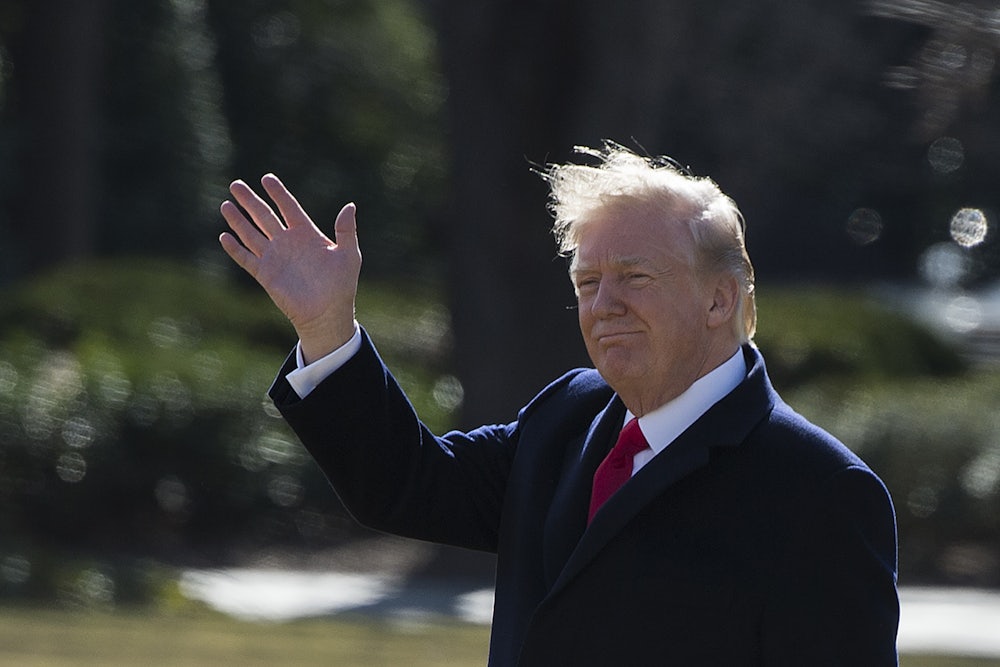For most of President Donald Trump’s first year in office, he and his lackeys used the stock market as a kind of alternate approval rating. His administration may be chaotic, his responses to the tragedies in Charlottesville and Puerto Rico may have been shameful, his approval rating may be the lowest of any first-year president in history—none of that mattered. What really mattered, this argument went, was the Dow Jones, which consistently set records, peaking at 26,618 on January 29.
Trump’s stock market cheerleading was a significant reversal. On the campaign trail in 2016, when Barack Obama was still president, he consistently downplayed the surging stock market. “Believe me: We’re in a bubble right now. And the only thing that looks good is the stock market—but if you raise interest rates even a little bit, that’s going to come crashing down,” Trump said in the first presidential debate in September of that year. “We are in a big, fat, ugly bubble. And we better be awfully careful.”
But with few achievements to speak of for much of 2017, the stock market became his go-to pitch. “The reason our stock market is so successful is because of me,” Trump told reporters in November. “I’ve always been great with money, I’ve always been great with jobs, that’s what I do. And I’ve done it well, I’ve done it really well, much better than people understand and they understand I’ve done well.”
Over the last two trading days, the stock market has plunged—an ominous 666-point drop on Friday was the prelude to a 1,500-point plunge on Monday that got the media chattering. (The Dow clawed back some of those losses toward the end of the day, ending down 1,100 points.) Monday’s drop was the largest in Wall Street history in terms of sheer points, but in terms of percentages it barely registered in the top 20. There are nevertheless important lessons about the foolishness of Trump’s political strategy and the state of the economic recovery itself.
For the last decade, inflation has been bafflingly low, despite the fact that central banks have barely raised interest rates from their recession-era, emergency lows. The result has been a flood of cheap, readily available money, with none of the usual consequences of runaway prices. Then late last week, there were rumors that the Federal Reserve may hike interest rates, thanks in part to data suggesting that wages were increasing in response to a shortage of qualified workers.
This is a good thing. As the economy nears full employment, wages are increasing, suggesting that the long, post-2008 economic recovery is reaching a new stage. But corporations have become so enamored by low-interest rates that even the possibility of a slight increase sent the market reeling for two days. This is, in some ways, absurd. The report that triggered this free fall was a good one for the economy, which presumably would be good for the stock market. Furthermore, a modest hike in interest rates would signal confidence in the economy’s future health. But rates have been low for so long that corporations seem uncertain how to survive without them, even though they just got a massive gift from Congress in the form of a $1.5 trillion tax cut package.
Reports of rising interest rates triggered the fall, but there have long been signs that a correction—a decline of 10 percent or more—is overdue. The stock market hadn’t seen a dip like this since two Januarys ago, while the price-to-earnings ratio of the S&P 500 hit 23.6 last week and a high P/E ratio often signals that a correction is coming. (The P/E spiked in the wake of the corporate tax cut that was passed in early December.)
Either way, this is a useful reminder that the stock market is not the economy. But Trump has tried to have it both ways, pointing to stocks and the recent growth in wages as proof that he was personally juicing the U.S. economy. This was never really true—the tax cuts might have excited the stock market, but he can hardly take credit for the economic gains of the last decade. But it was certainly a short-sighted political decision, and not only because, as the commentariat quickly pointed out, the stock market invariably goes down. This is the reason other presidents have wisely touted other economic gains. (Given the fact that half of Americans don’t own stocks, this is also a wise strategy because it’s vastly more relevant to voters.)
It was also short-sighted because the kinds of factors that would cause the stock market to fall—rising wages, the Fed hiking interest rates, a correction for a runaway market—should be welcomed by the president. Now he’s stuck in an impossible dynamic that may be here to stay.
